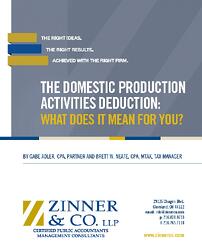The Domestic Production Activities Deduction: Are You Reaping Its Benefits?
The Domestic Production Activities Deduction, or DPAD, is currently the second largest domestic corporate tax break available to taxpayers. It was enacted as part of the American Jobs Creation Act of 2004 to provide a deduction for U.S. businesses, and to offset the repeal of a tax break for U.S. exporters.
Who does the DPAD affect?
Many businesses, especially those in the manufacturing and construction sectors, can reap the benefits of the DPAD.
Unlike similar tax provisions in the past, the DPAD is also available to taxpayers who do not export. This includes sole proprietorships, both C and S corporations, partnerships, LLCs, cooperatives, estates, and trusts.
The DPAD is broad enough that roasting coffee, producing cuts of meat or fish for wholesale, software development, and making hamburgers qualifies for the deduction.
To help you better understand exactly what the DPAD is and who it affects, Zinner & Co. Partner Gabe Adler, CPA, and Tax Manager Brett Neate, CPA, MTax have written "The Domestic Production Activities Deduction: What Does It Mean For You?" a FREE guide to the major provisions of this significant tax break.
Some of the topics covered include: 
- Who the DPAD affects
- What activities qualify as eligible for the DPAD
- What the deduction means
Download "The Domestic Production Activities Deduction: What Does It Mean For You?" to better understand how this tax break may affect your business.
Learn more about the practical solutions Zinner & Co. provides for those in the Manufacturing & Distribution industry, and contact our experts to help you develop innovative and personalized solutions to achieve your short and long term goals...


